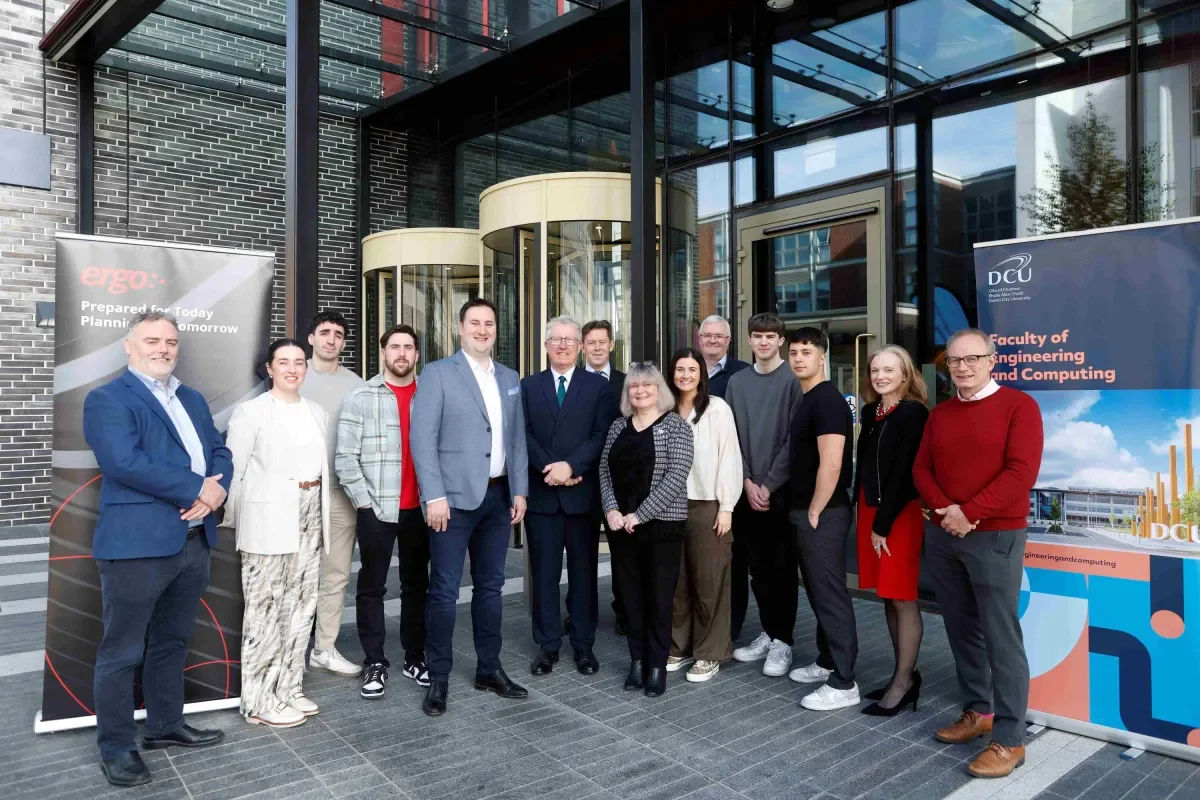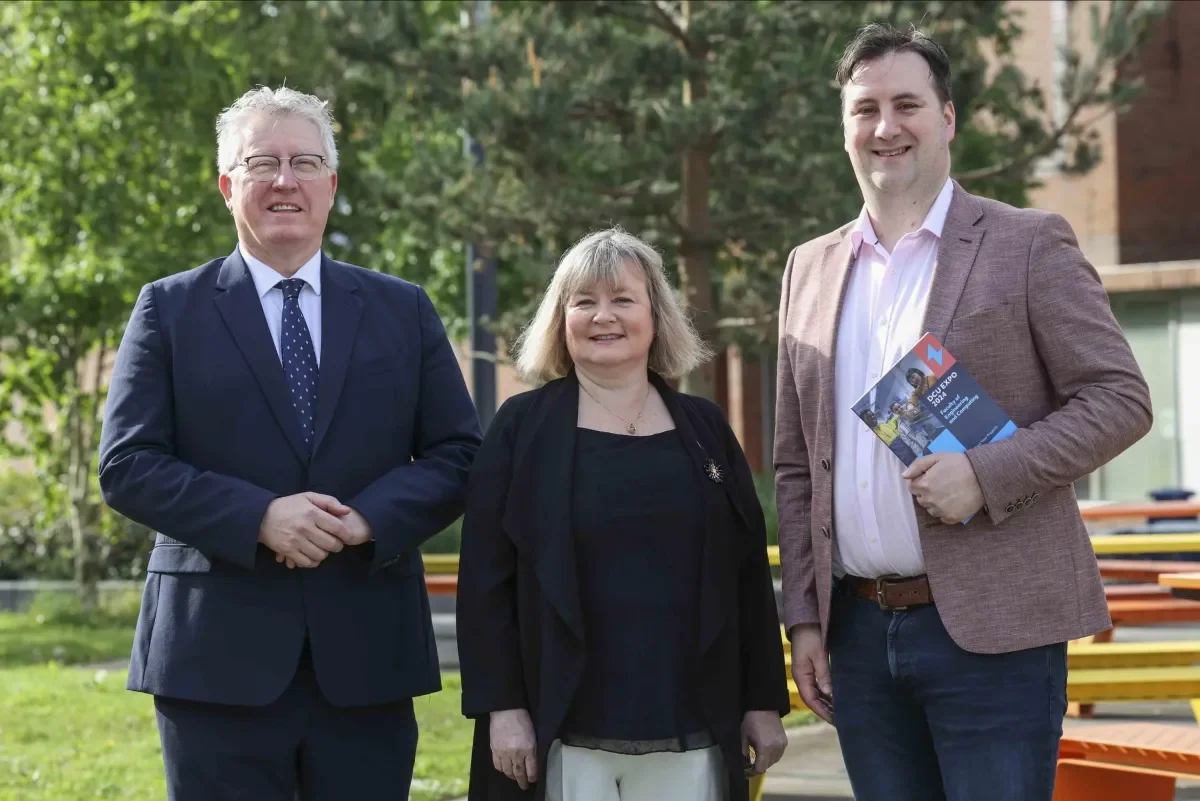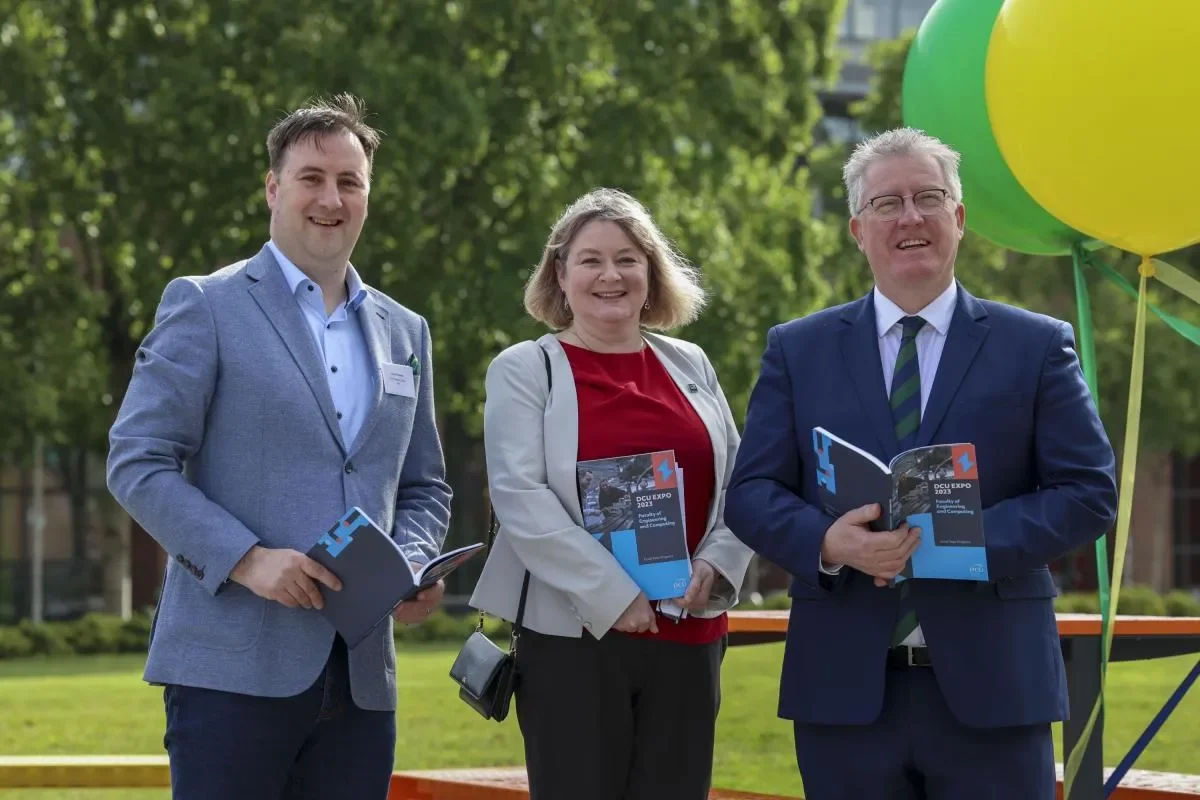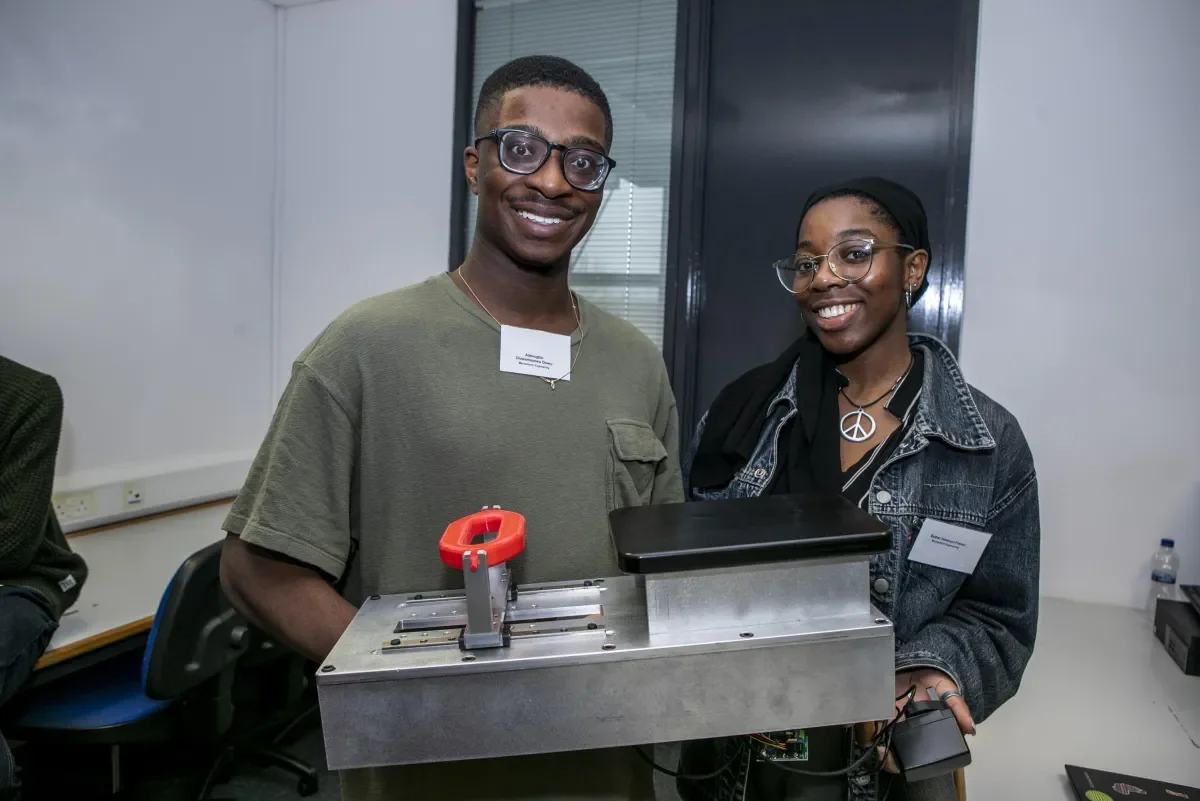
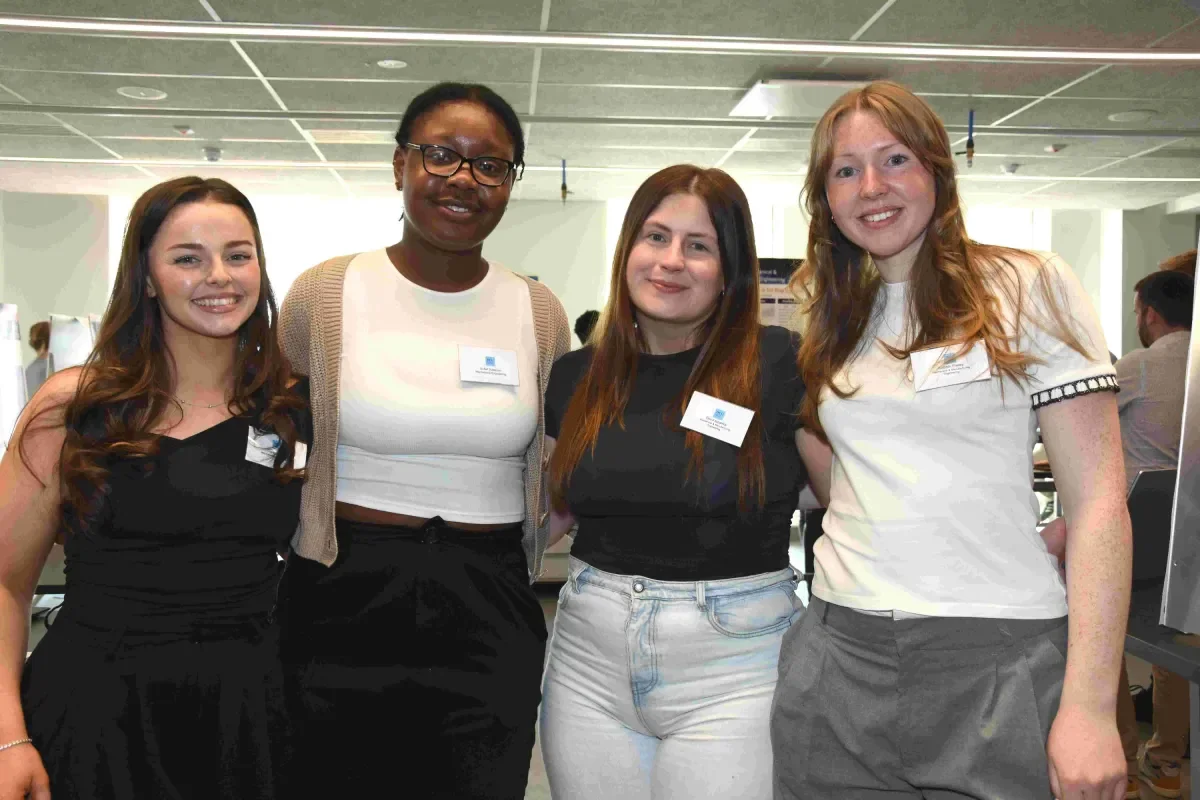
Final Year Projects Expo
The Final Year Expo allows soon-to-be graduates to display their acquired skills and expertise gained at DCU to industry professionals. The occasion frequently leads to students receiving job interviews and employment opportunities.
For over 30 years, the Expo has continued to grow and develop. The initial event featured around 80 projects, and today we are proud to say that it has grown to over 200 projects. The diverse range of projects reflects the significant efforts and commitment of everyone involved: students, lecturers, technical and professional support teams, and enterprise partners who provide real-world experience, through INTRA placements, for students.
Final Year Project Expo 2025
The Final Year Project Expo for the Faculty of Engineering and Computing 2025 was held on Wednesday, 7 May, with support from lead sponsor Ergo, world-class cloud and managed services provider. More than 250 final-year projects were showcased by DCU’s Faculty of Engineering and Computing students, who are preparing to graduate. This year’s Expo featured a strong emphasis on sustainability and social impact, with many standout projects demonstrating the students' creativity, innovation, and technical excellence.
Expo Prize Winners 2025
SAP Ireland proudly sponsored a prize at the DCU Final Year Project Expo 2025, presenting the Patrick Stewart Innovation Award for the third consecutive year. This special award honours the memory of Patrick Stewart, a talented DCU student and valued SAP colleague, who tragically passed away at the beginning of his final year in 2021.
Patrick began his academic journey studying architecture at Trinity College Dublin before transferring to DCU’s Enterprise Computing programme. He was known for his intellectual curiosity, warmth, and a remarkable ability to spark innovation through meaningful conversation. Patrick's untimely passing was a profound loss to all who knew him, and this award is a tribute to his legacy.
The Patrick Stewart Innovation Award recognises a final-year student whose project not only demonstrates technical excellence but also reflects Patrick’s belief that challenging discussions can drive real innovation and positive change through technology.
This year’s winners of the award are students Anzhe Yuan and Derek Harkin for their exceptional project EyeHerd. EyeHerd is an innovative livestock monitoring platform designed to enhance cattle welfare and streamline farm operations. By integrating video surveillance with real-time analytics, it detects anomalies such as signs of distress or illness and monitors behaviours like feeding and resting. The platform features an intuitive interface, personalised dashboards, and real-time alerts, ensuring ease of use for farmers with varying levels of technological experience. EyeHerd enables data-driven decision-making, optimises labour efficiency, and supports sustainable farming practices. Its scalable design accommodates farms of all sizes, providing a modern, user-friendly solution to the challenges of traditional livestock monitoring.
The panel was highly amazed by Anzhe and Derek's project as it was really well executed and met the objective of “starting a conversation”. This very special award also supplies the winning students with IT hardware worth €2,000, alongside a special invitation to SAP Ireland's next D-Com event.
Congratulations to the awardees, and thank you to SAP for their continued support and prize sponsorships.
Infineon is a global leader in automotive semiconductors, power systems, and the Internet of Things (IoT), delivering innovative solutions that support green energy, clean mobility, and smart, secure technology. Its comprehensive portfolio spans sensors, microcontrollers, power semiconductors based on Si, SiC, and GaN, as well as advanced components for human-machine interaction and vehicle connectivity. The company also hosts one of its largest global customer-facing supply chain management teams at its Customer Logistics Management office in Dublin City, as well as having Research & Development Design Centres across Ireland.
The company awarded students the ‘Best Electronic and Computer Engineering Project’ at this year’s Expo. The two awardees were Patriks Vitols Jegurs for his innovative project ‘Parallelising LUT-Based Topological Thinning for Colon Centreline Extraction’ and Joseph O’Reilly for his fascinating project ‘Mitigating Privacy Risks in Retrieval-Augmented Generation (RAG) Systems.’
Patriks’ project investigates the parallelisation of a topological thinning algorithm for centreline extraction in virtual colonoscopy. Centreline extraction is a key step for navigating tubular structures in medical imaging, used for patient diagnosis. The project implements and accelerates an existing Lookup Table (LUT)-based thinning algorithm optimisation to improve computational efficiency. A region-growing segmentation algorithm is developed to extract the colon from volumetric CT data before thinning is applied. GPU acceleration using OpenCL is utilised to enhance performance. The project evaluates the speed, accuracy, and scalability of the parallel vs sequential implementations. Other contributions to the method are also examined in the project.
Joseph’s project addresses privacy challenges in Retrieval-Augmented Generation (RAG) systems, which enhance Large Language Models (LLMs) by retrieving external knowledge to generate accurate, contextually enriched responses. While RAG systems improve factual accuracy and reliability, they often process sensitive data, such as personal or proprietary information, which can lead to significant privacy vulnerabilities. This project develops a privacy-preserving pipeline that integrates Differential Privacy (DP) techniques with Low-Rank Adaptation (LoRA) to fine-tune a T5-small model. The goal is to generate synthetic query-document pairs that maintain semantic fidelity while minimising the risk of exposing sensitive information.
Thank you to Infineon for sponsoring this award, and congratulations to Patriks and Joseph for being awarded this amazing prize.
Headquartered in Boston, US and privately held for 78 years, Fidelity's mission is to strengthen the financial well-being of its customers and deliver better outcomes for the clients and businesses it serves. In 1996, Fidelity established its first international presence in Ireland. Since then, Fidelity Ireland has played a vital role within the global organisation, providing key technology, operations, and support services. From the outset, the team in Ireland has continuously driven innovation while fostering a dynamic and inclusive workplace culture. Today, it is home to a diverse, multi-cultural community of creative professionals who collaborate closely with colleagues across the US, Europe, and India. Fidelity Investments Ireland currently employs over 2,000 associates in the region.
Fidelity Ireland proudly sponsored the Women in STEM Award at this year’s Faculty of Engineering and Computing Final Year Projects Expo. This prestigious award recognises and encourages the contribution of women to the STEM disciplines, helping to address the challenges of STEM Talent shortage in Ireland and champion a more inclusive future for the industry.
This award was given to Zeynep Altintas and Lizel Sulaj for their highly impressive project ‘PulsePath’, and to Yana Koleva and Lakshita Dubey for their amazing project ‘Bridge: A Web-Based Platform Designed to Optimise Cloud Configurations and Migrations.’
‘PulsePath’ is a web application designed to enhance crowd safety and optimise resource management at medium to large-scale open-air festivals. By providing real-time crowd density insights, it enables organisers to monitor congestion, improve response times, and allocate staff and amenities more efficiently—reducing overcrowding risks and enhancing the overall festival experience. The platform features an interactive MapBox-powered map that displays live crowd movement, facility capacity indicators, and real-time notifications. WebSocket technology ensures instant updates, empowering organisers to make proactive, data-driven decisions. Developed using Django, Python, PostgreSQL, and React, PulsePath streamlines festival operations while improving safety and cost management.
‘Bridge’ offers infrastructure recommendations, helping small companies migrate to the cloud within their constraints. Using infrastructure as code, it provides disaster recovery automation through Terraform scripts for resilient cloud deployment. Powered by a machine learning module trained on real-time performance data for cloud benchmarks and workloads, Bridge optimises cloud services to meet business needs. This project aims to reduce the migration overhead and costs for small businesses, allowing them to fully benefit from the scalability of cloud providers, primarily Amazon Web Services (AWS). At its core, this project bridges the gap between small companies and the expanding public cloud sector.
Huge congratulations to the award recipients, and our thanks to Fidelity Ireland for their continued support in promoting diversity and excellence in STEM.
KAESER, headquartered in Coburg, Germany, is one of the world’s leading manufacturers of compressed air systems, with over 50 subsidiaries worldwide, more than 8,000 employees, and annual revenues exceeding €1.7 billion. With over a century of expertise, this family-owned business is known for producing high-quality, German-engineered compressed air solutions that prioritise efficiency, reliability, and sustainability.
Operating in Ireland for more than 30 years, KAESER has become a trusted partner to industries across the country, providing advanced systems and expert support. The Irish branch plays an important role within KAESER’s global network, helping to drive productivity, energy efficiency, and environmental stewardship while making a valuable contribution to the local economy.
This year, KAESER have kindly sponsored the Final Year Projects Expo, awarding students with the ‘Efficiency Excellence Award.’ The awardee is Evan Meegan, who completed the highly impressive project Developing an AI-Driven Buildings Energy Consumption Prediction Model Using Machine Learning (ML) Techniques for Co-Simulation.’
This project uses AI and machine learning—specifically LSTMs, RNNs, and MLPs—to predict building energy consumption from real-world time-series data. Through preprocessing and evaluation using RMSE and R² scores, the model supports smart building management and promotes energy-efficient, sustainable engineering.
Congratulations to winner Evan Meegan, and thank you to KAESER for sponsoring the event.
Since 1989, Intel has invested over €30 billion in Ireland, developing the most technologically advanced industrial campus in Europe. Today, Intel’s presence in Ireland spans a wide range of activities across its global business, from cutting-edge research and design to large-scale manufacturing. With a workforce of 4,900 employees across the country, Intel continues to play a vital role in innovation and production. Its newest facility, Fab 34, is now manufacturing chips Intel 4 and Intel 3, the company’s most advanced process technologies. The launch of Fab 34 also represents a European first: the use of extreme ultraviolet (EUV) technology in high-volume manufacturing. Meanwhile, Fab 24 supports chip production for Intel’s foundry customers.
Intel has generously sponsored the ‘Best Engineering Project’ at this year’s DCU Final Year Project Expo. Their first place prize was given to Gareth Quinn for his exceptional project ‘Computer Vision and Deep Learning Based Prediction for Automated Manufacturing Quality Control.’ This project explores the use of neural networks and deep learning for classifying the quality of inkjet-printed electrodes in an automated quality control (QC) station. By integrating image processing technology with neural networks, we improve classification accuracy and reliability. Images of inkjet-printed electrodes were analysed using a convolutional neural network (CNN) and a feedforward neural network, both optimised for maximum accuracy. This project demonstrates how advanced image processing and neural network optimisation enhance QC automation. By reducing manual inspection, this approach increases efficiency and ensures consistent product quality in manufacturing lines.
Joint second place was awarded to Afua Adu for her fantastic project ‘Converting IoT Sensor Data into Natural Language Summarisation Using Generative AI’, and Jake White for his amazing project ‘A Small Cell Based Solution for Indoor Navigation.’
Afua’s project aims to make complex IoT data more accessible by leveraging Generative AI to convert raw sensor outputs into user-friendly insights. It focuses on transforming intricate datasets, such as air quality and traffic data from Irish cities, into natural language summaries. These summaries will be delivered via an interactive chatbot, allowing users to engage and receive personalized responses. Instead of presenting dense tables of numerical data, the chatbot will generate concise, human-like summaries, such as, “Dublin recorded a good PM2.5 air quality reading of 10.6 μg/m³.” By simplifying the interpretation of IoT data, this project enhances public awareness in areas like urban planning, environmental management, and health. It fosters greater engagement with data, enabling both policymakers and citizens to make informed decisions.
Jake’s project is about developing localisation and navigation algorithms for indoor environments. It will be carried out using indoor access points (mini-indoor base stations). This would be useful in complex environments such as hospitals, airports and underground stations. The project involved the following; making a map of an indoor environment, generating a network of routes to navigate the map, and modeling the attenuation of a signal as it travelled from a transmitter to receivers (small cells) through the environment including obstacles such as walls in the map. The location of the transmitter was calculated by using path loss models and trilateration algorithms. Lastly, algorithms were used such as Dijkstra to find the shortest route to a desired location.
Congratulations to the three prize winners and thank you to Intel for sponsoring this prize.
For over 40 years, Veolia Water Technologies has been Ireland’s leading provider of ultra-pure water solutions for critical applications, particularly within the pharmaceutical and life sciences sectors. Renowned for its full-service approach, Veolia designs, builds, manages, and supports advanced water and wastewater treatment systems, offering end-to-end expertise from project design and commissioning to validation and ongoing technical support. With the country’s largest team of pure water specialists, Veolia is committed to delivering innovative, reliable solutions while offering graduates the opportunity to contribute to impactful, real-world projects.
Veolia’s ‘Sustainability Award’ aligns with their commitment to delivering environmentally sustainable solutions. Student Síobhra Doyle was awarded this impactful prize for her project ‘Assessing the Feasibility of District Heating in Ireland: A Modeling Approach and Case Study in North Dublin’.
This project explores district heating (DH) in Ireland through modelling approaches and a feasibility study. It reviews DH operations, categorises simulation tools by method and data requirements, and applies these insights to assess a proposed DH project in North Dublin. The research also examines how international modelling tools can be tailored to suit the Irish context.
An honourable mention went to student Sean O’Brien for his project ‘The LCA of District Heating Systems in Ireland.’ This project uses life cycle assessment to evaluate the environmental and cost impacts of various district heating systems in Ireland, aiming to identify sustainable, low-carbon solutions using the Tallaght DH system as a case study.
Thank you to Veolia Water Technologies for your support, and congratulations to the awardees.
Dun & Bradstreet holds the world’s largest commercial database, comprising over 600 million records sourced from 30,000 data providers and refreshed five million times each day. In Dublin, teams are leveraging modern technology stacks to build world-class engineering capabilities and deliver flexible, scalable solutions through a cloud-first approach. For nearly 200 years, Dun & Bradstreet has enabled clients and partners to thrive by harnessing the power of data, analytics, and insight-driven solutions.
With a global team of over 6,000 professionals, the company remains a trusted leader in business decisioning data, providing critical insights across all stages of the business lifecycle. As it undergoes an exciting transformation, Dun & Bradstreet continues to redefine the way it works and collaborates, opening up a wealth of new opportunities.
The ‘Best Use of AI & Machine Learning’ award was given to students Anzhe Yuan and Derek Harkin for their exceptional project ‘EyeHerd’.
EyeHerd is an innovative livestock monitoring platform designed to enhance cattle welfare and streamline farm operations. By integrating video surveillance with real-time analytics, it detects anomalies such as signs of distress or illness and monitors behaviours like feeding and resting. The platform features an intuitive interface, personalised dashboards, and real-time alerts, ensuring ease of use for farmers with varying levels of technological experience.
EyeHerd enables data-driven decision-making, optimises labour efficiency, and supports sustainable farming practices. Its scalable design accommodates farms of all sizes, providing a modern, user-friendly solution to the challenges of traditional livestock monitoring.
Thank you to Dun & Bradstreet for sponsoring the Final Year Projects Expo 2025, and congratulations to students Anzhe and Derek.
Established in 1926, the Davy Group sits at the heart of wealth and capital in Ireland, providing a broad range of services to high-net-worth individuals, self-directed investors, small-to-medium enterprises, credit unions, corporations, and domestic & international institutional investors. We are over 900 people dedicated to delivering exceptional outcomes for our clients. Our headquarters are in Dublin city centre, while our offices in Belfast, Cork, Galway, and London service our regional and UK clients.
Davy gave out the ‘Best Mobile or Web Application’ prize at the Expo to a well-deserving project. The winners of the prize, chosen by the team from Davy, are Dylan Crowe and Jennifer Trainer for their exceptional project ‘Vocalise.’ This project involves developing a speech therapy web app designed to provide AI-driven feedback for individuals with speech challenges. It aims to support those with speech impairments caused by conditions such as stroke, traumatic brain injury, or other speech-related disorders.
By analysing user inputs through speech recognition, the app identifies pronunciation errors and fluency issues, offering real-time feedback. This is especially valuable for individuals who need continuous practice outside of regular therapy sessions. The theoretical foundation of this project is based on established speech therapy techniques and the latest advancements in speech recognition technology.
The Davy team praised this project for its level of innovation, great design, and how the demo highlighted the features and technology behind it.
Congratulations to the prize winners, and thank you to Davy for sponsoring the event.
Final Year Project Expo 2024
The DCU Faculty of Engineering and Computing Final Year Project Expo 2024 took place on Wednesday, 8 May with lead sponsor Ergo, world-class cloud and managed services provider. 224 projects were on display by the soon-to-be graduates from the Faculty of Engineering and Computing at DCU at this year’s Expo. There were a notable number of environmentally and socially-beneficial projects created this year, displaying the students' impressive innovative and cutting-edge skills.
Expo Prize Winners 2024
SAP Ireland was a prize sponsor of the DCU Final Year Project Expo 2024, giving out the Patrick Stewart Innovation Award which has been dedicated to their late colleague and DCU student, Patrick Stewart. The Patrick Stewart Innovation Award recognises Patrick’s talent for fostering innovation through meaningful conversations and aims to support students in continuing the discussions initiated by their final-year projects.
This year’s winner of the award were Enterprise Computing students Gavin Taylor and Bartosz Szyjka for their project ‘WiserWasteSolutions - Inventory Management for Perishable Products that Incorporates Data Analytics to Reduce Waste and Promote Sustainability Goals’. This is a web application that allows consumers to scan an order ID code in supermarkets, notifying them as well as the shop employees of the product’s expiration date. Several technologies were used in the formation of this web application, including CSS, HTML5, JQuery, JavaScript, Python, SQLite, and Django.
The panel was highly impressed by Gavin and Bartosz's project for its technical proficiency. They commended their outstanding presentation skills, which reflected the approach of their late colleague Patrick in simplifying complex concepts into easily understandable language. This very special award also provides the winning students with IT hardware worth €2,000, alongside a special invitation to SAP Ireland's next D-Com event.
Alan Fahey, Senior Vocational Trainer at SAP, said:
“For the second year, SAP sponsors a prize in memory of DCU student, and our SAP colleague, Patrick Stewart. For nearly 2 decades now SAP has been involved in INTRA and graduate hiring from DCU and we are always impressed with the quality of academic and professional achievement of the students. Moreover, we continue to value the personal qualities we recognised in Patrick and continue to shine through in the next generation of students and grads.”
Stryker, a global leader in medical technologies, in partnership with DCU, awarded Éabha O’Meara its Female Engineering Excellence Prize at the DCU Final Year Projects Expo earlier this month.
Éabha was recognised for her project on “Single Value Metric for Text-To-Video Model Evaluation,” which made significant advancements in a complex and topical area of artificial intelligence. The project successfully communicated a lengthy and complex concept concisely and with great enthusiasm.
Awarded by Stryker’s employee resource group, WISE (Women in Science and Engineering), this prize is a recent example of WISE’s role in cultivating diversity, encouraging women to enter technical industries, and building the next generation of STEM leaders. This program advocates for the growth of women in technical roles and seeks to advance women in the industry by influencing change, educating employees, developing talent, and recruiting diverse talent. Stryker's commitment to innovation and diversity, exemplified by the work of its WISE group, is a testament to its vision of driving better healthcare outcomes through collaboration with customers, employees, and academics.
Lisa Byrne, WISE Ireland Lead at Stryker, explains the significance of this initiative:
"The WISE group in Stryker's AMagine facility in Cork were delighted to sponsor the Female Engineering Excellence Prize at the DCU Final Year Projects Expo. Making connections with students who are coming into industry is paramount to our talent pipeline. It’s inspiring to see the high quality of work these students are creating, along with seeing firsthand the skill sets that are being cultivated in the various colleges.
The Female Engineering Excellence Prize in particular is important to WISE as our mission is to advocate for the growth of women in technical fields. Supporting women coming into the industry underscores our commitment to fostering talent and diversity. By sponsoring these awards, we hope to build the confidence of these students to see the true value of their own skills as they enter industry.”
Stryker, a global leader in medical technologies, is driven to improve healthcare outcomes through innovative products and services. Established in the 1960s, the company has expanded its presence to over 75 countries and built a workforce of 52,000 employees worldwide, with over 5800 employees in Ireland. Stryker in Ireland operates manufacturing and R&D facilities across 8 locations in Cork, Limerick, and Belfast.
Since 1989, Intel Ireland has invested €30 billion to build one of the most technologically
advanced industrial campuses in Europe. The operations of Intel in Ireland play a crucial role
in the company's worldwide manufacturing network, producing Intel’s most advanced and
efficient products to meet the demands of artificial intelligence, autonomous driving, and
cloud computing applications. Their annual contribution to the Irish economy amounts to
€2.75 billion.
Intel has generously sponsored the ‘Best Engineering Project’ at this year’s DCU Final Year
Project Expo. Niamh Kilgallen, fifth-year Mechanical and Manufacturing Engineering, and
Faruq Sulaimon, fifth-year Mechatronic Engineering, were jointly awarded this prize.
Niamh’s project ‘Bubble Formation from Microtextured Surfaces in Alkaline Electrolysis’
investigates the ideal parameters for laser texturing nickel electrodes to enhance hydrogen
production in alkaline electrolysis. This method aims to reduce the bubble formation at the
electrode interface to improve the efficiency of green hydrogen generation.
Faruq’s project ‘Fruit Classification Using Deep Learning Computer Vision’ uses deep
learning to develop a classification algorithm for various fruits. The model employs
established computer vision practices like feature extraction and newer technologies like
residual connections to create an accurate prediction model that could be used by
organisations that engage in food processing, and dietary monitoring.
Congratulations to both our prize winners, and thank you to Intel for sponsoring this prize.
IBM in Ireland attracts, develops, engages and retains talented employees in a dynamic and competitive environment across their Research, Development, Sales and Business Consulting divisions. As a globally integrated enterprise, IBM operates in more than 175 countries. Their workforce in Ireland is highly skilled, reflective of the work they do for their clients’ digital transformations and supporting their mission-critical operations. Their employees in Dublin, Cork and Galway include developers, consultants, client delivery and services specialists, research scientists and others. Their teams are among the world’s leading experts in cloud, AI, quantum computing, cybersecurity and industry-specific solutions.
IBM has a long, proud history as a pioneer in diversity and inclusion. At IBM they know that a diverse and inclusive workplace leads to greater innovation, agility, performance and engagement, enabling both business growth and societal impact. They ensure their employees from diverse backgrounds are engaged, can be their authentic selves, build skills and achieve their greatest potential.
Project #151, ‘GestoLearn’ by Computer Applications students Okikiola Sanni and Effa Issa Faqir Al Bulushi, was awarded the ‘Best use of Opensource’ prize. ‘GestoLearn’ is a web app that uses gamification to teach American Sign Language words. Its features include quizzes, sign capture for assessments, webcam emotion detection, community interaction, a progress-tracking dashboard and profile editing. It also offers interactive lesson videos covering greetings, family and emotional state. The tool aims to educate people on basic sign language for better communication between the hard of hearing and those who do not know sign language. Okikiola and Effa’s project was chosen due to the overall idea, the use of opensource technologies and most of all the narrative of how they conquered the problems that COVID presented.
Congratulations to both prize winners, and thank you to IBM for sponsoring this prize.
Amdocs is an international telecommunications technology corporation that focuses on software and services for communication, media, financial services providers, and digital businesses. Based in St. Louis, Missouri, the company offers specialised solutions in these areas.
Their roughly 30,000 staff worldwide are dedicated to expediting their clients' transition to the cloud, standing out in the age of 5G, digitising and automating their processes, and delivering advanced communication and media experiences for end users that leave a lasting impact.
Amdocs were prize sponsors at this year’s Final Year Projects Expo, offering the ‘Best Emerging Technology Project’ prize to students handpicked by their professionals.
Data Science students Edward Bolger and Stan Goodwin were announced as winners of this amazing prize. Edward and Stan’s project was titled ‘Enhancing Disease Classification in Raman Spectra of Exosomes Through Feature Engineering and Graph Databases’ (#51). This project combined machine classification and Raman spectroscopy to detect disease in a patient based on exosomes, small particles emitted by cells. Raman spectroscopy provides a unique spectral ‘fingerprint’ of a substance outlining its molecular structure. A machine learning algorithm was trained to differentiate between healthy and diseased exosome spectra. The model's performance and explainability were then improved using feature engineering, including creating a refined feature set based on peaks in the Raman spectra representing specific molecular bonds.
Edward and Stan used many technologies throughout the process, including Artificial Intelligence, Data Analytics, Digital Signal Processing, Spectral Analysis, Graph Databases Digital Signal Processing, Python, Machine Learning, and Neo4j. All in all, the project was very fascinating and thoroughly impressed the professionals from Amdocs.
Fiserv is a global technology company that provides financial services solutions to a wide range of clients. They specialise in developing and implementing software systems that help banks, credit unions, and other financial institutions improve their overall performance, enhance customer experiences, and drive innovation. Their services include core banking systems, payment processing solutions, risk and compliance management tools, and customer engagement platforms. Through their innovative fintech solutions, Fiserv enables financial institutions to offer more user-friendly, efficient, and transparent products and services.
Fiserv sponsored two different prize categories at the Final Year Projects Expo; Most Innovative Project and Best Computer Science Project. VP and Head of Technology, Vikram Tikoo, spoke about this year’s Expo saying “The quality of the projects was very good and we could see a lot of effort went into the projects. We had shortlisted a number of projects (technology products) ahead of our visit and the two selected were the most impressive, trumping all others:”.
WiserWasteSolutions, a project created by Gavin Taylor and Bartosz Szyjka, was selected as the Most Innovative Project. The project impressed with its wide application in addressing global food shortage/wastage, a well-functioning prototype demonstrating key concepts, and the use of open-source technologies.
WeBook took home the title of Best Computer Science Project. Created by Scott Brady and Nace van Wyk, this project stood out for its design in terms of flexibility in solving contemporary campus problems, white-label product flexibility for different layouts/brands, and seamless user experience achieved through adaptive design principles.
Congratulations to both winning groups.
Established in 1926, the Davy Group has become a reputable and influential force in wealth management and capital markets, fostering long-lasting connections. Their dedication lies in providing top-notch results for their diverse range of clients, be it individuals, businesses, or institutions. With over 800 staff members located across offices in Dublin, Cork, Galway, Belfast and London, technology plays a central role in serving their clientele. The team possesses a wide range of skills including software development expertise, network engineering proficiency as well as database administration knowledge among others.
Davy gave out the amazing ‘Best Mobile or Web Application’ prize at the Expo to a well-deserving project. The winners of the prize, handpicked by leading industry members from Davy, are Colm McCarthy and Niall Cian Quigley. Colm and Niall’s project ‘ParkIT’ was specially chosen due to how technically challenging it was and the strong UX awareness on the mobile app. The industry professionals from Davy specifically pointed out the use of Raspberry PIs, OPEN APIs, and a lot of Python coding to manage the full experience from car registration recognition to allowing entry/exit in a car park, and a mobile app to manage user payments.
ParkIT (#117) is a modern car parking system that transforms the traditional parking process. It uses automatic number plate recognition for smooth entry and exit, removing the necessity for physical tickets. Users engage with ParkIT through a user-friendly mobile app, where they can conveniently handle payments and guest access. The app also offers real-time information on parking availability and pricing. By eliminating paper tickets, ParkIT promotes an efficient, eco-conscious experience, combining convenience, efficiency, and security to provide a valuable solution for different parking facilities. Colm and Niall made great use of numerous technologies, including Python, Machine Learning, Dart, Flutter, Firebase, OpenCV, and Tesseract. Overall, this project is extremely impressive and the level of hard work that went into it is apparent.
Deloitte, the leading global provider of professional services, is proud to announce the winners of the ‘Best Enterprise Computing Project Prize’ at the DCU Final Year Projects Expo, Robbie Keegan and Marcus Evans for their innovative application, DriveReady.
Deloitte, the number one professional services firm in the world, with offices across Ireland in Dublin, Belfast, Cork, Limerick, and Galway, is committed to recognising and celebrating the exceptional achievements of individuals who have demonstrated a leadership mindset, a curious and problem-solving disposition, and a strong drive to grow their careers. Deloitte is committed to fostering an environment that empowers people to thrive and excel in their respective fields.
DriveReady, the winning project, is a cutting-edge driving lesson management application specifically designed for driving instructors across Ireland, with the primary goal of revolutionising the current booking process and empowering instructors to focus more on teaching and less on administrative intricacies. The platform seamlessly integrates modern technology to simplify the process of scheduling, managing, and enhancing driving lessons, providing a seamless connection between instructors and learners from the initial sign-up to becoming a confident and responsible driver.
Deloitte extends its heartfelt congratulations to Robbie Keegan and Marcus Evans, the winners of the 'Best Enterprise Computing Project Prize,' and encourages individuals who share a passion for innovation, problem-solving, and a leadership mindset to explore the exciting career opportunities available at Deloitte.
Fidelity, one of the nine prize sponsors of the Expo, assist more than 50 million people in achieving their most important financial objectives, administer employee benefit programmes for over 27,500 businesses to enhance their employees' overall well-being, and provide advanced investment and technology solutions to support over 16,000 wealth management firms and institutions. Their diverse portfolio of businesses combined with their independence enables them to gain a comprehensive understanding of the market while also providing the stability and scalability necessary for long-term strategic planning.
Fidelity’s ‘Women in STEM Award’ is an amazing prize that they offered at this year’s Expo. This prize is a very progressive one, promoting the presence of women in the STEM field that has been primarily male-dominated in history.
Two groups were awarded this prize by professionals at Fidelity; ‘DegreeDive’ by students Ellen Kenny and Grace Tyrrell, and ‘GestoLearn’ by students Okikiola Sanni and Effa Izza Faqir Al Belushi.
DegreeDive offers an aptitude testing system to provide students with personalized learning recommendations for suitable level 8 degrees at Irish colleges within their predicted points range. This tool helps students align their academic and personal interests with college courses, navigate the CAO application process, and set achievable grade goals. DegreeDive aims to reduce dropout rates and empower students with informed choices for a smoother educational journey.
GestoLearn is a web application that uses gamification techniques to teach American Sign Language for basic or commonly used words. It features quizzes, sign capturing for assessment, emotion detection, a community for user interaction, a progress dashboard, and interactive lesson videos covering topics like greetings, family, and emotions. The app aims to bridge the communication gap between hard-of-hearing individuals and those unfamiliar with sign language.
Huge congratulations to both winning groups.
Final Year Project Expo 2023
The Final Year Project Expo returned for 2023 and was sponsored by the world-class cloud and managed services provider, Ergo. Over 200 projects produced by almost 300 soon-to-be graduates from the Faculty of Engineering and Computing at DCU featured in this year’s Expo. A number of projects focused on renewable energy, sustainability efforts and digital accessibility for all individuals.
Expo Prize Winners 2023
SAP Ireland sponsored a prize at the Final Year Project Expo 2023 and dedicated it to their late colleague Patrick Stewart, who was also a DCU student. Patrick passed suddenly from natural causes at the start of his final year at Dublin City University in 2021.
The Patrick Stewart Innovation Award celebrates Patrick’s ability to drive innovation by starting conversations. It aims to provide winning students with the opportunity to continue the conversation they started with their final year project.
Computer Science students Jason Henderson and Conor Joyce were selected as winners of this award by a panel of Patrick’s colleagues and graduates of the SAP Ireland STAR Program. Their final year project, ‘PlusVasis’, is an intuitive online platform that streamlines container management and orchestration for developers, enabling them to focus on building their applications. It offers seamless networking, security, and scalability, allowing users to spin up containers for their websites or databases effortlessly. The technologies used include Docker, Go, REST, Nomad, Svelte, and TypeScript.
The panel praised Jason and Conor’s project for its technical proficiency and commended their exceptional demonstration skills. The way they articulated the project, using both technical jargon and layman's terms, was reminiscent of their late colleague Patrick who had a similar talent for distilling complicated concepts into easy-to-understand language.
In keeping with the rewards of the Patrick Stewart Innovation Award, students were granted IT hardware amounting to €2,000 and given a special invitation for SAP Ireland's D-Com occasion in March 2024.
Alan Fahey, Senior Vocational Trainer at SAP, said:
“It is so heart-warming to see the skills, qualities and character of our friend and colleague Patrick live on at DCU. It is an honour to have his peers judge the projects and to award this prize in his memory. Congratulations to Jason and Conor for winning this prize in its first year. SAP Ireland looks forward to continuing our close relationship with DCU and the final year project expo into the future.”
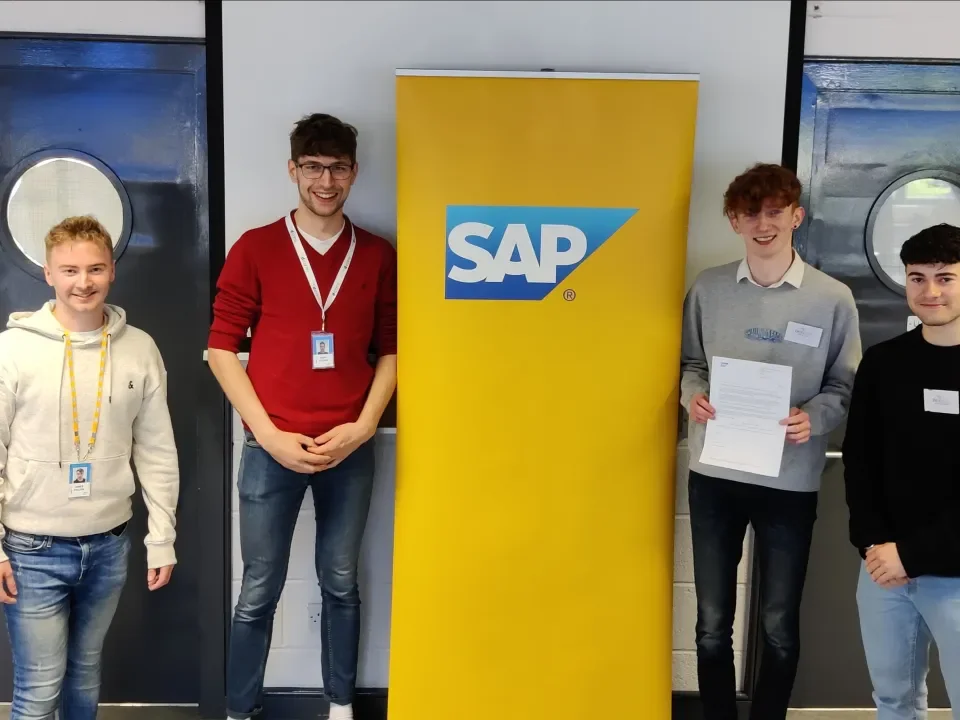
Patrick Stewart Innovation Prize Winners Jason Henderson and Conor Joyce
Datalex sponsored one of the six prizes at this year's Dublin City University Final Year Project Expo.
Aoife McCarron and Julia Dempsey won the ‘Best Enterprise Computing’ prize sponsored by Datalex for their innovative project called ‘GPApp’. They were chosen from a total of fifty projects and were awarded €500.
‘GPApp’ was created as an appointment booking management system for the use of General Practices, patients and receptionists. The app simplifies the appointment booking process for patients, doctors, and receptionists by providing a centralized platform. It utilizes an integrated calendar to ensure streamlined scheduling and reduces overcrowding at General Practices. This system aims to improve overall patient experience by eliminating lengthy wait times making it more convenient for everyone involved.
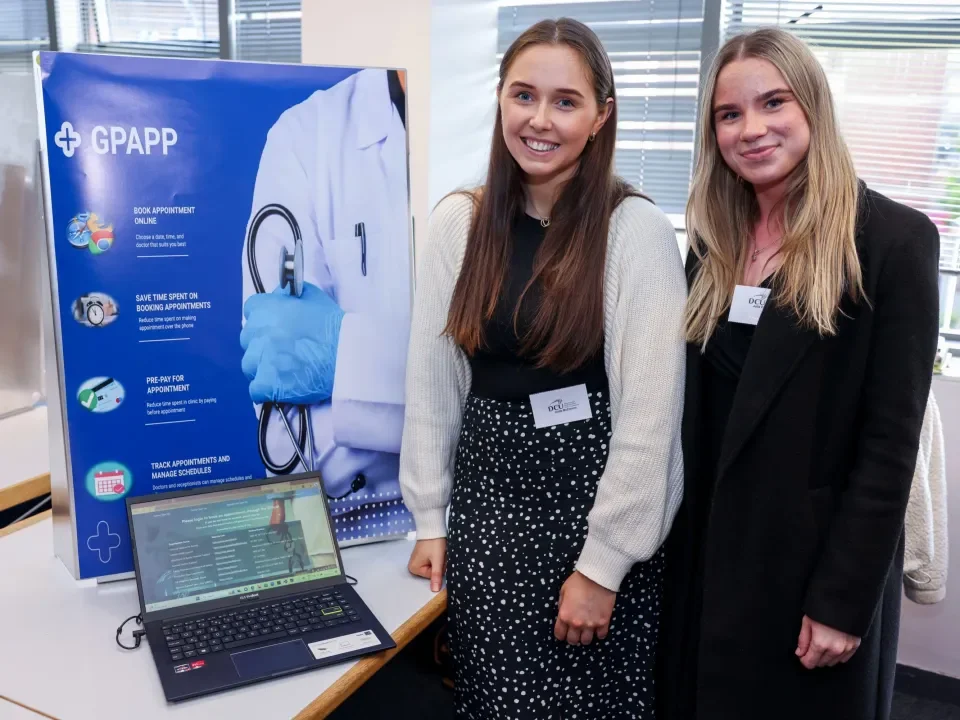
Datalex Prize Winners Aoife McCarron and Julia Dempsey
Davy sponsored the 'Best Mobile or Web Application' prize at the Final Year Project Expo 2023. Enterprise Computing students Niamh Osasu Idehen and Aytomiwa Adekunle received €500 in prize funds for their project ‘TutorDojo’, a tutoring platform for programmers.
‘TutorDojo’ emerged from a need for a programming-specific tutoring platform that comes with all the essential features that you would expect such as scheduling lessons and messaging on the platform. The concept of TutorDojo is based on the utilisation of an Integrated Development Environment - a software application that helps programmers develop software code efficiently - and a unique approach to conducting lessons. Specifically, each lesson involves a video call coupled with access to an IDE for both students and tutors. The technologies used include CSS, HTML5, JQuery, JavaScript, Nodejs, Python, SQLite, Django, WebRTC, Judge0, REST, Socket.io and Peerjs.
The team from Davy determined TutorDojo as the winner due to its meticulous research and thoughtful design. The functionality of the application was well executed and operated smoothly during the demonstration. The students, Niamh and Aytomiwa, were recognised for their ability to explain the project and articulate the difficulties encountered.
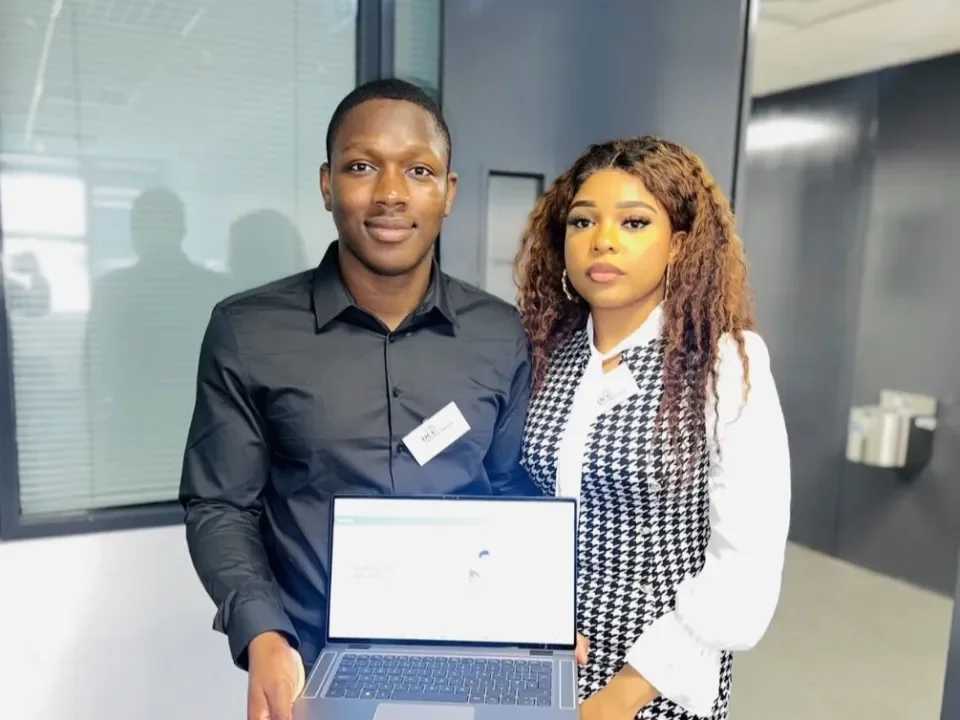
Davy Prize Winners Niamh Osasu Idehen and Aytomiwa Adekunle
IBM kindly sponsored a prize at the Final Year Project Expo 2023. The IBM prize was awarded to the projects that demonstrated the best use of Open Source Technologies. Open source refers to a license that allows users to view, edit and share software without any restrictions. This includes access to the underlying code of the program
With almost twenty projects submitted for this prize, it was a difficult decision for the team at IBM. Enterprise Computing students Jesse Keogh and Greg Kelly and Computer Science students Ailbhe Byrne and Caoimhe De Buitlear were announced as joint first-place winners, with each team receiving €250.
Jesse Keogh and Greg Kelly created ‘Kontribute’, a Web3 Creators platform that brings story writing and digital art collectables together. The platform includes features such as dencentralised story storage, likes, tipping, polls, NFT marketplace and NFT minting.
‘Classroom Caption’, developed by students Ailbhe Byrne and Caoimhe De Buitlear, is a real-time automatic speech recognition web application that provides transcriptions during lectures to be viewed by students. The automatic speech recognition model was fine-tuned using Irish accents to improve its accuracy. The transcripts are saved to a database to allow students to view them and lecturers to edit them.
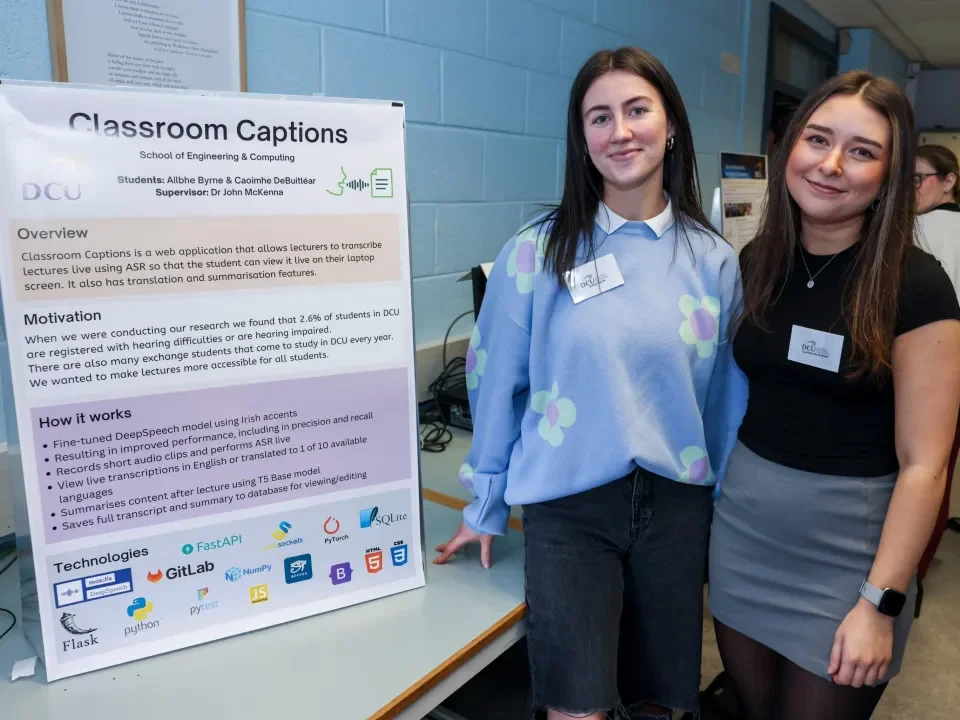
IBM Prize Winners Ailbhe Byrne and Caoimhe De Buitlear
Intel Ireland was one of six prize sponsors at the Final Year Project Expo 2023.
Mechatronic Engineering student Aimee Shanley-Brookes and Biomedical Engineering student Abbey Farrell were joint first place winners of Intel’s ‘Best Engineering Project’ prize, which saw over 100 projects in the running.
Aimee’s project, ‘A Smart Floor for Energy Harvesting’, looked to create an energy generating smart floor using sustainable materials. The smart floor takes wasted mechanical energy from people's footfall and converts it into electrical energy to power small devices and supply clean energy, relieving pressure off the energy infrastructure.
Abby’s project looked to develop a low-cost microfluidic device that is capable of fully automating the initial phase of sample preparation of a nucleic acid amplification test.
Anthony Gallagher, a final year Mechanical and Manufacturing Engineering student, won second place for his project investigating the use of Motion Analysis Simulation in industry. The aim was to produce simulations that are of a level at which they can be implemented into the design stage of the company’s manufacturing process.
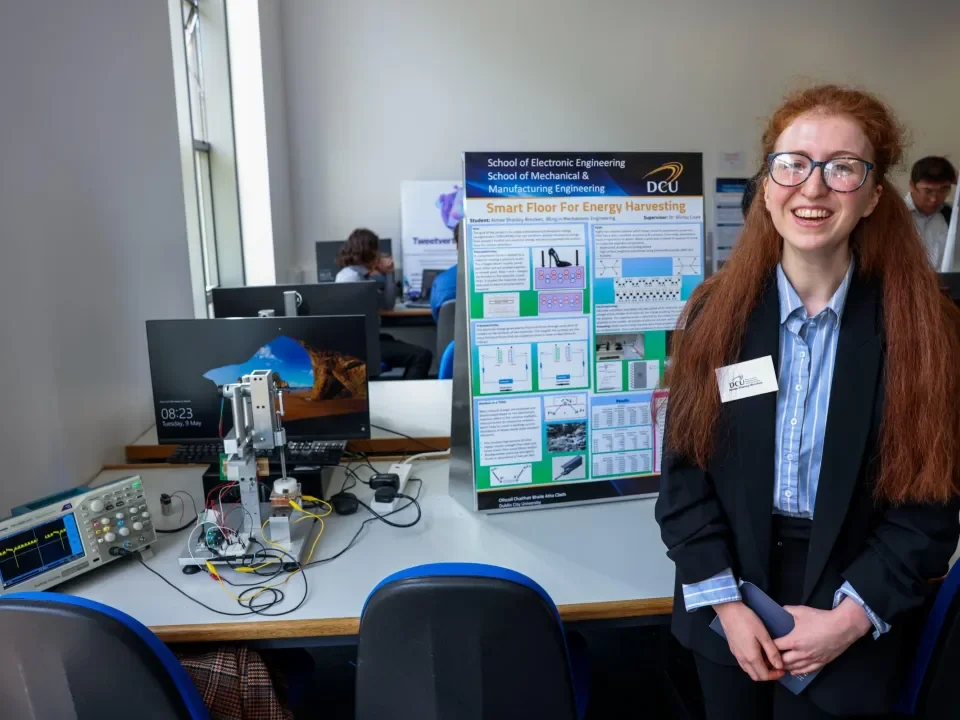
Intel Ireland Prize Winner Aimee Shanley-Brookes
The Final Year Project Expo at Dublin City University had six prize sponsors this year, one of which was Fidelity Investments.
Final year students Imrich Toth and Egor Shilokovskiy shared first place victory with Sylwia Bielinska and Megan Cahill in the ‘Best Use of Technology’ Prize sponsored by Fidelity Investments.
Computer Science students, Imrich Toth and Egor Shilokovskiy, created a programme that translates hand sign language called ‘Hand Read - Translation of Hand Sign Language’. They used a Machine Learning detector to track the movements of hand signs. OpenCV Framework was utilised for this project; it is an open-source software library for computer vision and machine learning. Users upload their video, which detects the hand signals and generates subtitles as output.
Computer Science students Sylwia Bielinska and Megan Cahill shared the prize for ‘Best Use of Technology’ for their project entitled ‘Dyscalculia Math Visualiser App’. This app is designed to assist people with dyscalculia, a disorder that affects numerical comprehension. It uses mobile phone scanning technology to present math problems in an easier-to-understand format. The app also includes a pre-screening test to determine if the user has dyscalculia.
Both winning teams were awarded €250 each and invited to visit Fidelity's office for a celebratory lunch in recognition of their successful final year projects.
Final Year Project Expo 2022
After two challenging years of separation, the Faculty of Engineering and Computing at DCU held its Final Year Project Expo with an on-campus celebration of its soon-to-be graduates and cherished links with industry.
Attended by a host of external partners, the opening ceremony of this flagship event kicked off in the Student U Centre with a light breakfast, during which eager employers had an opportunity to meet and mingle with final year students, allowing both parties to make valuable, in-person connections.

